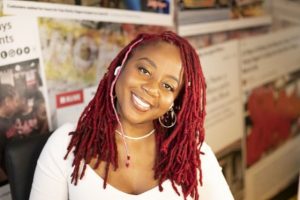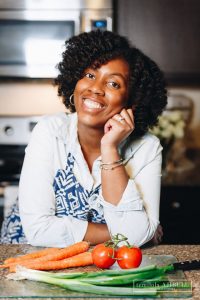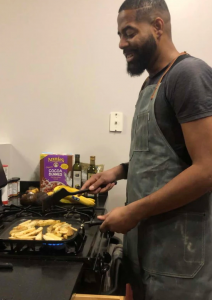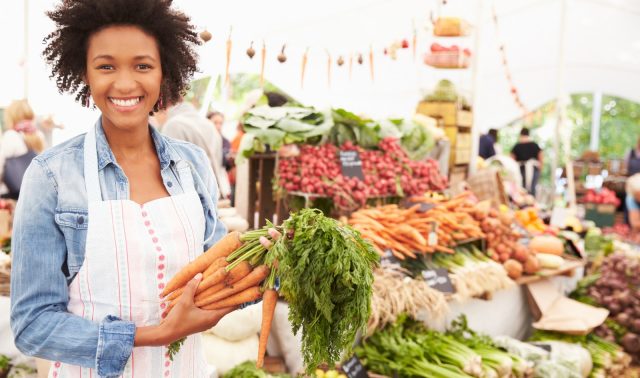By Vidya Rao
www.today.com
Customers at chef Pinky Cole’s wildly popular Atlanta-based restaurant Slutty Vegan are willing to wait upwards of an hour in line just for a taste of her decked-out plant-based burgers.
The food is decadent and delicious, dripping with sauces and toppings like sweet jerk plantains and New Orleans-style battered vegan shrimp. But it’s not just the food that’s a draw, it’s the vibe.
Slutty Vegan turns veganism into a block party — you might even catch employees singing, dancing and taking part in a viral TikTok challenge. The brand makes veganism fun and approachable, showing diverse customers that there’s no single vegan aesthetic.
“I made sure that the music is loud and upbeat. It’s vibrant, it’s poppy. Then my employees yell at you and make you feel like you’re at a family reunion,” said Cole, who has purchased a building in Birmingham’s Woodlawn community for her first location outside the state of Georgia and expects to open in 2022. “So your mind is so consumed with this experience that you’re not even thinking about, ‘Oh, is this going to taste good?’”
Cole waxes poetic about being “marinated in the womb of a vegetarian,” growing up in a Jamaican-American household eating Rastafarian Ital cuisine. Burgers were never part of her diet. But when she left vegan-friendly Los Angeles and New York behind to open a restaurant in Atlanta, a mecca for meat, she knew she had to overcome misconceptions about vegan food, and the familiar burger was the perfect vehicle to do it.
“The mission here is not to convert them over to being vegan, but getting meat eaters to just be open, especially when there’s so much food insecurity and underlying health concerns in the Black community,” said Cole, who was recently named to the Forbes Next 1000 list honoring impactful entrepreneurs. Slutty Vegan does pop-ups in cities around the country and Cole is planning at least a dozen more brick-and-mortar restaurants — all located in primarily Black communities that are considered food deserts, where fast food abounds and healthy options are hard to find.
Making Veganism Cooler

Cole is among a growing community of Black vegan chefs, bloggers, cookbook authors, social media influencers and celebrities who are changing perceptions about veganism. Beyonce and Serena Williams tout the benefits of veganism, and hip-hop culture has embraced it, too. In 2016, health and wellness — incorporating plant-based eating, food justice and animal rights activism — was added as the tenth element of hip-hop (putting it alongside elements like breakdancing and beat-boxing). Black vegan cookbook authors like Bryant Terry and Jenne Claiborne share recipes and how-tos for plant-based cuisine rooted in the African diaspora and Black American culinary traditions.
Actress Tabitha Brown became a bonafide social media star thanks to the mix of inspirational content and vegan recipes she posts across her social channels, garnering 77 million likes on TikTok alone. After battling a chronic autoimmune disorder, she adopted a plant-based diet and started posting vegan versions of the Southern dishes she grew up on, seemingly making magic by turning vegetables like carrots into a substitute for bacon.
“People like us are helping make veganism cooler, so more people are embracing the lifestyle,” said Cole.
Pew Research from 2016 found that eight percent of Black Americans identified as strict vegan or vegetarian, compared with three percent of all Americans. The number of Black people who dabble in veganism is likely much higher: a 2019 Gallup Poll found that nearly a third of people of color in America reported cutting down on meat, compared to about a fifth of white Americans. The disproportionate impact of COVID-19 on the Black community has heightened the importance of a healthy diet to combat obesity and diabetes, and people passionate about social justice, self care, animal rights and the environment have found their way to veganism.
Rooted In Culture
After watching documentaries “What The Health” and “Food Choices” on Netflix four years ago, Desiree Daniels, who runs food blog I Can You Can Vegan, lost her appetite for animal-based food and decided to go completely vegan.
“The part that struck me the most was that a lot of the common diseases that you see in America are also linked to food choices,” Daniels recalled, saying that it made her wonder whether a plant-

based diet could have helped her mother, who died from cancer. “When one family member is sick, the whole family is sick. The family is always in and out of the hospital. How can I give myself and my family the best chance of living a happy, fulfilled life where I’m not in the hospital or I’m not sick? That meant changing to a vegan diet.”
After watching a Netflix documentary, Desiree Daniels lost her appetite for animal-based food and decided to go completely vegan.
The North Carolina native said learning about the environmental and health impact of pig farming also weighed on her — particularly because North Carolina is one of the top pig farming states, and Black people are disproportionately affected by the resulting toxic waste.
“I couldn’t continue to buy into that industry knowing how it was affecting people’s lives, maybe even my family members,” Daniels said.
That sent Daniels on a journey of discovery, and rather than feeling restricted by it, veganism opened up a whole new culinary world. “What surprised me was the abundance of food that I was missing out on because I was stuck in that standard American diet mindset,” she said. For the first time, she was using ingredients like lentils and jackfruit, and learning the incredible versatility of cauliflower and avocado to make dishes creamy without dairy. She started “veganizing” the Southern dishes she grew up eating. She got family and friends, people who never would have sought out vegan food, to try what she cooked and open their minds to eating more plant-based foods.
“I don’t know that my dad had ever eaten cauliflower before I went vegan,” she laughed.
That’s when she started her blog to share what she had learned with other Black women who were curious about veganism. The most popular recipes on her blog are reimagined soul-food classics like (tofu) fried chicken, mac and cheese made with a plant-based cheese sauce, and collard greens flavored with liquid smoke and paprika rather than ham hocks or turkey leg.
“I had this image of white, hippie, tree-hugging people, and I just could not identify with that. I thought that vegans were crazy. I’m like, who in their right mind would give up cheese?” Daniels said. “Before diving in, I didn’t see myself represented in those spaces. So I thought it was important for me to be that person for someone else.”
‘Pioneers In Veganism’
The art of vegan cooking isn’t new to communities of color, with Indian, Middle Eastern and African cuisines offering vegan dishes — just without the label. Even most Southern dishes have plant-based roots, as Black people who were enslaved cultivated and cooked ingredients they were familiar with, like rice, sorghum, okra, yams and black eyed peas, which were brought over from Africa.

“There’s always been this river of Black folks who have been pioneers in veganism next to the wider ocean of folks who are omnivores,” said Tracye McQuirter, nutritionist and author of “Ageless Vegan” and “By Any Greens Necessary.” “In West Africa, for generations, the food was primarily plant-based.”
Trayce McQuirter became a vegan 34 years ago after seeing comedian and Civil Rights activist Dick Gregory speak about veganism.
During the Civil Rights Movement, many Black activists chose veganism, connecting animal rights to the larger fight for liberation. McQuirter became a vegan 34 years ago after seeing comedian and Civil Rights activist Dick Gregory speak about veganism.
“He traced the path of a hamburger from a cow on a factory farm through the slaughterhouse process, to a fast food restaurant, to a clogged artery, to a heart attack,” McQuirter recalled. “And for me, that kind of sealed the deal.”
As a student at Howard University in Washington DC in the late ‘80s, McQuirter said that the transition wasn’t difficult because even back then she was surrounded by a Black vegan community that boasted at least 13 Black-owned vegan restaurants. Vegan food purveyors were always present at protests and other gatherings, she said. “People in the community chose to go vegan for all kinds of reasons — liberation reasons, spiritual reasons, health reasons — but they all just fit together.”
An ‘Adventurous’ Culinary Experience
In 2020, McQuirter had a goal to help 10,000 Black women go vegan, providing them with a 14-day meal plan, a 54-page guidebook and workshops in celebration of the 10th anniversary of her book “By Any Greens Necessary,” which has been lauded for promoting veganism in the Black community. The program had almost 15,000 women sign up.
Her biggest tip? “Don’t approach veganism with a sense of lack and deprivation; approach it with a sense of abundance.”
It’s clear there’s a hunger for vegan flavors and cooking techniques that satisfy diverse palates and don’t skimp on seasoning.

“You go to a lot of restaurants and you look for that one vegan option. There’s always going to be a salad and it’s always going to be some sort of veggie medley that lacks flavor. It’s so lazy and uninspired,” said Exavier Pope, a Chicago-based media personality, entrepreneur and lawyer. Pope became a strict vegan in 2017 after developing a yoga and mindfulness practice. More in tune with his body, he cut out animal-based ingredients as well as gluten to feel healthier and have more mental clarity.
He started cooking a lot of his meals from scratch, learning how to layer flavor and add umami with mushroom broth and nutritional yeast. He experimented with making various vegan cheeses using sunflower seeds, oats and potatoes. He started using aquafaba, or chickpea brine, as a binder for baked goods. And there’s no shortage of vegan tacos for Taco Tuesday. He posts the scrumptious meals in his Pope’s Vegan Kitchen series on his social media channels.
“You can have a connection with food that doesn’t invite guilt. It invites exploration and adventure and excitement and joy, and my body still feels good the next day. That’s something that I want to share with others,” said Pope, who’s looking at opening a restaurant concept and potentially writing a cookbook. “People always ask me about whether I cheat. Well, there’s no reason to cheat because this is a great relationship.”
Pinky Cole wants people to reimagine the role that food can play in revitalizing their health and their communities. Slutty Vegan did a pop up in Birmingham that was incredibly successful, bringing out a thousand people, Cole said. That’s when she decided she needed to open a location in Woodlawn.
“We’re almost three years old and we still have lines down the block, so that just shows that we’re doing something right,” Cole said. “People see a successful woman-owned, Black-owned business, disrupting the industry in the most unconventional way, and people can’t help but to be proud of that.”





